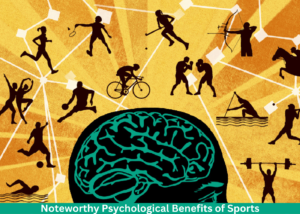Sports for mental health are particularly important since they teach children valuable life values that are not generally addressed in schools. Sports teaches kids team spirit, loyalty, discipline, and, above all, respect – all vital lifelong skills that cannot be learned any other way.
Sports help moderate stress, and students with sports cultures tend to be better in class as they can effectively manage their stress levels and focus on tasks more easily than those who don’t regularly engage in physical activities. Furthermore, sports culture participation also benefits overall health and fitness, encouraging them to remain physically active instead of spending too much time glued to TV screens or video game consoles all day.
Participating in sports has been proven to help students improve their grades, gain greater self-confidence, and graduate earlier. Furthermore, sports participation provides students with an escape from academic work as they enjoy physical activity that does not rely on classroom performance for enjoyment and improved concentration, leading them closer to improved academic results. Being one of the best schools in Vadodara, Nalanda International School strongly emphasizes the participation of students in sports and cultural activities.
Noteworthy Psychological Benefits of Sports:

Sports Improves Mood
Playing sports releases chemicals that boost your mood, and this positive energy can only increase by participating in team sports and spending time with friends. Physical activity releases endorphins, which help relax and dissipate stress from daily life. Sports also teach us to never give up and remain persistent, an invaluable lesson that applies to other aspects of our lives. Boost mental health with team sports; even when defeat strikes one day, we know there will always be another chance tomorrow to come back stronger than before. Sports provide a perfect platform to practice perseverance – an attitude we can apply in other aspects of our lives.
Sports also help build analytical and observational skills. Playing sports teaches players to analyze a situation and make decisions quickly – skills beneficial in the workplace and personal relationships. Finally, playing sports helps develop sincerity in every action taken and prevents people from taking things lightly, which will benefit both settings. Some of the good schools in Baroda are already focusing more on their students’ participation in sports. Visit Nalanda International School to learn more about the importance of sports in students’ lives.
Sports Improves Concentration
Sports require players to have the ability to focus their attention and narrow it on stimuli that are crucial for success, known as attention narrowing or selective attention. Sport helps develop this capability by demanding participants pay close attention to details, like swinging a bat at the right moment to hit it at its intended location. When you regularly participate in sports, you will notice that sports not only improve your mood but also help you gain control of your focus and concentration.
Sports-induced concentration can also help people focus and avoid distractions in other tasks, including school or work. This is especially true of yoga, which helps clear mental clutter and improve focus. Studies have also demonstrated that sports participation is associated with improved mental health and life satisfaction, particularly as part of a team activity. It also offers endless psychological benefits. These results support the “Mental Health through Sport” model and show that community- and elite-level sports are associated with positive mental health outcomes for adults.
Sports Reduces Stress and Depression
As soon as your mind is engaged in an activity – be it playing a team sport or going for a brisk walk – your brain cannot focus on stressful or negative thoughts, helping reduce anxiety and depression. Furthermore, activity releases natural mood boosters called endorphins, leaving you happy and optimistic. Studies show that participants of sports experience better mental health than non-participants, likely due to social aspects associated with participation, including peer bonding, club support, and a sense of belonging. Furthermore, participants experience greater health-related quality of life compared to non-participants – with this effect becoming even stronger among those participating in activities they find enjoyable and choose themselves.
Youth sports participation has also been shown to contribute positively to mental health during adolescence and later adulthood, according to numerous studies. One such research paper found that teens who played high school sports experienced lower symptoms of depression than their counterparts who didn’t play at all; another revealed that participation in organized team sports for three or more years protected them against future symptoms of depression.
Sports Improves Sleep Habit
Many people experience difficulty sleeping due to stress and physical inactivity. Engaging in sports or other forms of physical activity is proven to improve sleep habits as they decreases depression and anxiety. In contrast, sports improve your mood, improving the quality of sleep by helping people sleep faster while deepening it further, consequently leaving people feeling refreshed and energetic throughout their day. Researchers have discovered a strong correlation between sports activities and mental health. Furthermore, research has uncovered various moderators, such as the type of sport practiced, age/gender of participants participating, duration, and whether team sports are being experienced.
Monitoring training loads, fatigue levels, sleep habits, and psychological outcomes over time may provide useful insights for targeting interventions designed to enhance sleeping quality, health outcomes, and performance outcomes. Nalanda International School is one of the leading schools in Vadodara to offer sincere and well-defined sports programs for their students. To learn more about our sports activities, visit Nalanda International School in Vadodara today!
Sports Boosts Self-Confidence
Participating in team sports can build confidence and strengthen relationships among teammates while meeting new people. Team sports provide a great way to meet new people. At the same time, group competition allows you to practice mindfulness techniques such as deep breathing and visualization, helping keep anxiety down during competitions or training sessions. Sports not only Improve your mood but also boost your overall confidence and focus. You must encourage your kids to participate in sports activities to boost mental health with team sports.
Sport participation has been associated with improved mental health, physical health, and social outcomes in adulthood; however, more experimental and longitudinal research must be completed to establish mechanisms to explain this relationship and its effects on mental health and social consequences. Further investigation should also be undertaken regarding potential moderators relationships in this regard. Self-confidence is often highlighted in sports media coverage and athletic rhetoric, yet its correlation with performance may not be as strong.
Why Sports Are Important for Students?

Playing sports has increased blood flow to the brain, improving concentration, memory retention, and creative output. Furthermore, sports help decrease depression, boost moods, and lower heart disease risks; therefore, every student must participate regularly to maintain both body and mind wellness. Sports activities teach children valuable teamwork, leadership, and discipline lessons. Furthermore, participation helps children overcome failure and build skills such as patience, focus, determination, and perseverance that will prove useful in all aspects of their lives and careers. Sports at the good schools in Baroda teach children that hard work pays off. Children who participate in school sports become physically fitter, more communicative, outgoing people with increased competitive spirit who are more open to meeting new people and experiencing different situations.
Apart from all that, joining a sports team requires dedication. It means spending less time studying, smoking, or socializing with friends – things that children may otherwise do more freely – thus teaching them responsibility and prioritizing what’s most important in their lives. In addition, participating in team sports provides children with invaluable life lessons: perseverance will become increasingly necessary as they advance academically, while playing can also help overcome any challenges life throws their way – such as playing their first or last game. This way teaches children perseverance that will remain with them forever – something they won’t forget.
Conclusion
As any type of sports activity requires commitment and dedication, engaging in it is often seen as a mark of good character and discipline. Furthermore, participation requires strategic thinking skills and quick decision-making ability; children who participate can develop these abilities that they can apply in everyday life or careers.
If a child plays their favorite sport regularly, they may consider making it their profession. Professional coaching from coaches can help them become experts at it; this career path provides many kids with a rewarding sense of achievement and self-esteem, plus they may enjoy what they’re doing for a living.
Visit Nalanda International School to learn more about the physical and psychological benefits of sports!

